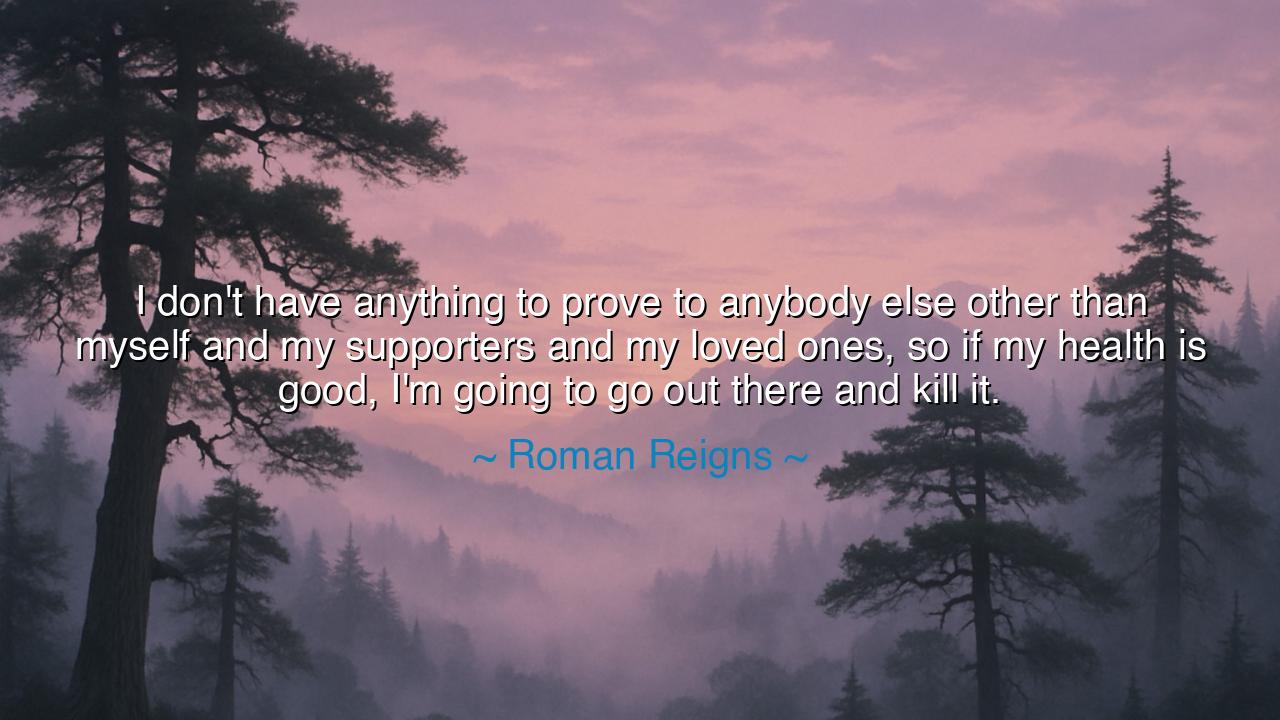
I don't have anything to prove to anybody else other than myself
I don't have anything to prove to anybody else other than myself and my supporters and my loved ones, so if my health is good, I'm going to go out there and kill it.






Hearken, children of the coming age, and attend to the roar within a single voice that speaks for a thousand hearts. Roman Reigns—whose name echoes like a war drum in the arenas of our modern amphitheaters—declares a simple, fierce creed: *“I don’t have anything to prove to anybody else other than myself and my supporters and my *loved ones, so if my health is good, I’m going to go out there and kill it.” In these words lives the old truth of the warrior and the sage: that power untethered to purpose is hollow, and purpose without health is vain. He crowns his life not with the approval of strangers but with the stewardship of his own spirit and the trust of those who walk beside him.
What does it mean to say one need not prove oneself to the multitude? The ancients taught that the soul must be judged by its own measure—not by the fickle breath of applause, nor by the shifting sands of public favor. Here is a declaration of sovereignty: to hold one’s standards inward, to answer first to conscience and community. The wrestler’s oath is the same as the shepherd’s—tend faithfully to what you can hold, and the world will take care of itself. Thus Roman’s boast is not arrogance but a reorientation: seek not universal consent, but commit to worthy ones—the faithful few who sustain you.
Yet the heart of the saying lies in the sacred word health. For what is valor, if the body that bears it is broken? The ancients knew that the temple of the body must be preserved so the spirit may move freely within it. When a champion says, “If my health is good, I will strike,” he reminds us that courage must be paired with care; that readiness to act grows from nights of sleep, days of training, and a vigilance over the fragile vessel we inhabit. Strength without reservation is not reckless bravado but tempered readiness—an art honed by patience and discipline.
This creed bears fruit in living memory. Think upon the life of a modern hero who fell ill yet rose again—one who, like the great patient-leaders of old, turned suffering into resolve. When illness cast its shadow, he withdrew from spectacle and battle, tending to what matters most—his body, his kin, his truth. In returning, he did not rush for empty triumph; he returned because he had been summoned by a deeper promise to those who had stood with him. This tale is neither vanity nor mere comeback; it is an ancient pattern: withdraw to heal, then reappear to serve better. From his trial came a purer courage, not to impress the crowd, but to honor those who believed.
Hear also the lesson of the elders: the tribe that protects its champions protects itself. The speaker names his supporters and loved ones as the true tribunal. This is a covenant—an exchange of faith: they give loyalty, he gives his whole self. Such bonds transform performance into legacy. The warrior who fights for applause fights alone; the warrior who fights for family and fellowship fights with a thousand hearts. In serving those who sustain him, he finds both restraint and fire—rest when needed, fury when called—so that his deeds may be worthy and his life, meaningful.
Therefore take from these words a counsel for your days. First, prioritize health—do not let the clamor of the crowd drown the whisper of the body. Rest when the body bids you rest; train with patience; seek care without shame. Second, choose your tribunal—let your measures be set by those whose lives are entwined with yours: the few who love and labor beside you. Third, act with intent—when you are ready, go forth with full measure; do not scatter your strength on hollow proving, but concentrate it on worthy trials where your courage serves more than your ego.
So go, you who would lead, you who would create, you who would love: let your life be governed by the same sacred reckoning. Guard your health, answer first to the true witnesses of your days, and when the hour is ripe, rise and kill it—not from fury, but from fidelity. In doing so you will follow an ancient way: live with purpose, protect the vessel, honor your kin, and strike only when you are whole. Thus shall your victories be both fierce and kind, and your story a light for those who come after.






AAdministratorAdministrator
Welcome, honored guests. Please leave a comment, we will respond soon